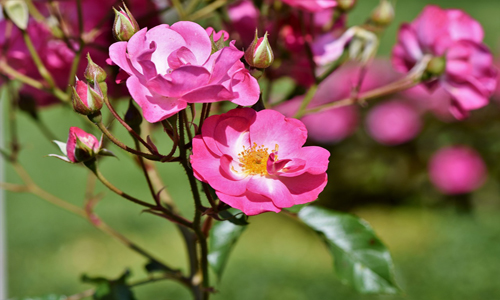OXNARD — The start of the New Year is the time to turn attention back to gardening. There is a surprisingly large number of activities for serious gardeners in January, says Agromin, an Oxnard-based manufacturer of earth-friendly compost products made from organic material collected from more than 200 California cities.
Maintain A Healthy Rosemary Christmas Tree: Rosemary Christmas trees (actually small bushes shaped to look like Christmas trees) are becoming more popular. While rosemary bushes need little water, while indoors, water once a week. After Christmas, move the bush outdoors. Keep trimming, shaping the bush like a Christmas tree until Christmas rolls around again.
Enjoy Poinsettias Year-Round: Poinsettia flowers will still look fresh through March. Once they begin to wilt, trim stems to about eight inches tall. Keep plants indoors until spring. They can then be transplanted into a bigger pot or planted directly in the ground. New growth will begin in October.
Plant Fruit Trees: Bare root fruit trees are dormant in winter but it’s the perfect time to plant apricot, plum, apple, pear and peach varieties. Once their root systems are established, they will start producing leaves in spring. Plant root balls about two feet deep in a three-foot round hole. Soil should be well draining. Add compost. Stake and tie the tree to keep it upright until established.
Prune and Pinch Roses: Prune no more than one-half of new growth from the previous growing season. Pruning and pinching encourages new growth that will produce fuller flowers in spring.
Plant Onion and Garlic: Onions, garlic, leeks and shallots can all be planted in the mild regions of California. Visit your local nursery to find the best for your area. Planting now will provide a full harvest next summer.
Plant Winter Vegetables: Plant vegetables such as lettuce, asparagus, broccoli, Brussels sprouts, cabbage, cauliflower, carrots, spinach, potatoes and beets. Watch out for cabbage moths. They lay their eggs on cabbage, cauliflower, Brussels sprouts and broccoli. The eggs turn into caterpillars that can decimate plants overnight. To prevent months from laying eggs on plants, create a netting barrier (which can also keep rodents away). Other options include spraying the plants with water containing a garlic and cayenne pepper mixture and planting pest-repelling plants such as marigolds, thyme and mint around the vegetables.
For more gardening tips, go to www.agromin.com
About Agromin: Agromin manufactures earth-friendly soil products for farmers, landscapers and gardeners. Agromin is also the composter for over 200 California cities. Agromin receives more than 600,000 tons of organic material each year and uses a safe, natural and sustainable process to transform the material into soil products. The results are more vigorous and healthier plants and gardens, and on the conservation side, the opportunity to close the recycling circle, allow more room in landfills and reduce greenhouse gas emissions. Agromin is a U.S. Composting Council Composter of the Year recipient. www.agromin.com, Call 800-247-6646 to arrange product delivery from one of Agromin’s compost or mixing/blending facilities located throughout California.

